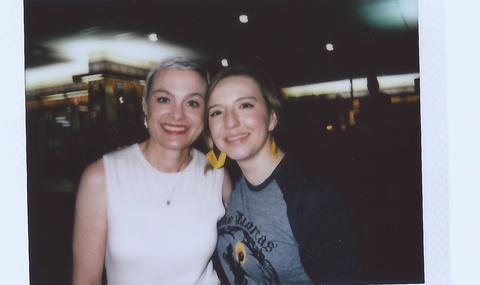The Nonfiction Writing Program is excited to welcome two incredible artists and thinkers to its permanent faculty: the writers Tisa Bryant and Sarah Minor.
Tisa

Tisa Bryant has come to Iowa from the faculty of the California Institute of the Arts, where she served as Director of its MFA program. But she had previously also served as NWP’s Bedell Distinguished Visiting Professor during the 2021-2022 school.
In his introduction to Bryant’s reading during her visit that year, John D’Agata wrote, “I met Tisa Bryant almost twenty years ago when she began working on what ended up becoming the most innovative anthology series from the past quarter century:
“Ten years in the making, spread over three volumes, and including close to four hundred artists, poets, novelists, and essayists, Tisa’s Encyclopedia series is perhaps the least informationally practical encyclopedia ever published, which is exactly what makes it so brilliant. It celebrates wonder, surprise, doubt, and possibility. Indeed, the very last entry in the last volume of the series is the word XENOGENESIS—a reference to Octavia Butler’s trilogy of scifi novels of the same name in which a woman conceives a child with an alien, resulting in a lifeform that no one has seen before.
“Tisa Bryant is a curator at heart, in other words: a visionary essayist who embraces the found, the discarded, the archived, the exhibited, the forgotten, the famous, the experienced, and the misread, and then manages to create such unified new forms of art with them that it's impossible to imagine them ever existing apart.
“Whether it is that legendary Encyclopedia series, her visual mixed tape films entitled The Black Book, her touching collaborative book Universal Remote: Meditations on the Absence of Michael Jackson, or the phenomenal Unexplained Presence, which elegantly fuses critical and creative approaches to explore Black representation in film, literature, and visual art, Tisa’s dedication to take what’s given and to make it her own is a model for every one of us who essays.”
How does Tisa feel about joining the NWP faculty?
“After months of anticipation and logistical shenanigans,” she writes, “it’s a joy to finally be settling into life in Iowa City, and to be on the cusp of my first semester as faculty in the Nonfiction Writing Program and in the Department of English. Relocating from Los Angeles to Iowa City has been a still-unfolding bodymind[1] adventure that has the essay written all over it: a study in contrasts between places, cultures, climates and spaces; a humbling assessment of what “moving energy” demands, literally, figuratively, physically, materially; a reflection on how the emotional swirl of farewells and welcome, the generosity and encouragement of friends, colleague, students and family old and new supports taking risks and balances the necessary disruption that is change; and a meditation on how this moving energy yields something personally, pedagogically and creatively refreshing, new perspectives and intentions, warm light cast towards an unknowable future. I’m excited about all the exchange and writing in process and to come. On that note, I’ve been low-key musing (as perhaps are you) on an ongoing essay of encounter and accretion through Iowans apparent love for vanity license plates. Spotted in daily abundance, they offer a declaration, a puzzle or a smile, they build a narrative of sorts in my mind, as I gaze, ponder, then move on.”
Sarah

Two years ago, the NWP advertised a temporary gig for a visiting adjunct professor. Some awesome writers applied for it, but after spending an afternoon of interviewing and deliberating, the mini search committee that was assembled to hire our brief visitor unanimously declared themselves wowed by a young and brilliant writer named Sarah Minor.
And in the short subsequent span of her time in the NWP, Sarah has become an integral member of the program's community: tackling our rigorously unforgiving "History of the Essay" course, introducing new pedagogical models for our students, and spearheading lots of fun moments to help the NWP emerge from the pandemic with a sense of humor, unity, and drive. (In lieu of our annual Nondenominational Xmas Party this this winter, for instance, Sarah hosted instead a "Dumpling-Making Holiday Party," which still somehow managed to include a traditional visit from our resident Santa Stein.)
The author of Slim Confessions: The Universe as a Spider or Spit, Bright Archive, and The Persistence of Boneyleg: Annotated, Sarah has won innumerable awards for being what one critic has called "one of the most formally innovative writers working today.”
Of Bright Archive, Ander Monson writes, “Sarah Minor’s sense of what an essay is, what it can look like, and what it can contain is way beyond what almost anyone else is even attempting. Open to any page in this book and you’re going to encounter something new. Every essay’s an invention, a new possession, and I for one am down with being possessed if the spirit that possesses me is like Minor’s, comprised of wonder, wit, and intelligence.”
Like Tisa Bryant, Sarah works across media, exploring ideas and making art that fit as comfortably in galleries and on screens as they do in books. And so we were doubly privileged to be given the chance this year to also steal Sarah away from her position at the Cleveland Institute of Art so that she could become our second new permanent member of the NWP faculty!
Sarah said, “I'm thrilled to be joining the NWP faculty after spending two years at Iowa working with MFA and undergraduate writers as a Visiting Assistant Professor.
The conversations and writing coming out of Iowa's NWP have shaped current movements in nonfiction. The program is outstanding by outside measures, but teaching here has proved especially rewarding because of the depth and breadth of study our faculty offer, the three full years our students spend writing here, and the opportunities Iowa City provides to work across disciplines and attend readings by world-class writers almost every week. I left visual art for the essay, a medium that tracks the passage of a mind at work, a form that orients art towards action. It's an honor to join a program grounded in both the history and contemporary powers of that form, and to get to kick off a new era in the NWP house!”
[1] Sami Schalk, Bodyminds Reimagined: (Dis)ability, Race and Gender in Black Women’s Speculative Fiction, Duke University Press, 2018